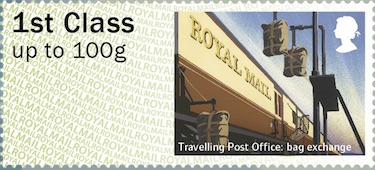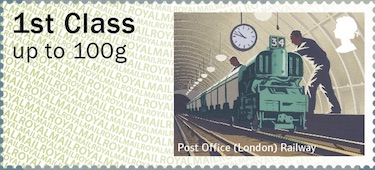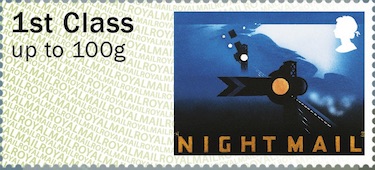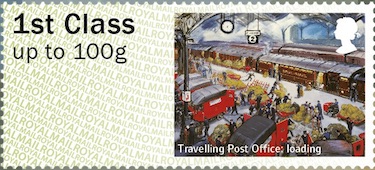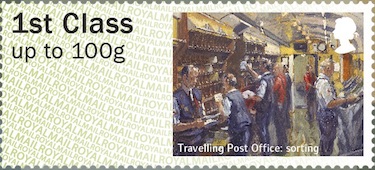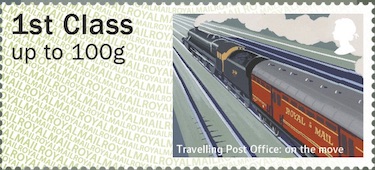Norvic Philatelics - GB New Stamps and Special Postmarks
Pictorial Faststamps: Mail by Rail - 15 February 2017
Pictorial Post & Go stamps appear in
machines in UK Post Offices for defined periods of time in the year and
this series is intended to provide attractive stamps that are appropriate
for the season in which they are issued.
Post & Go stamps are sold from Post
Office Self-Service Kiosks (SSK), which allow customers to weigh their
letters and packets, pay for and print postage stamps and stationery
supplies, often without the need to visit the counter. The first Post
& Go machine was trialled in The Galleries Post Office® in Bristol in
2008. The labels will be used in Post & Go machines at Post
Offices around the country, and from Royal Mail machines at Enquiry
Offices, Museums and Spring Stampex. The labels can be obtained with
6 different service indicators: 1st class up to 100g & 1st class Large
up to 100g, a dual-value Europe up to 20g/World up to 10g, Europe
100g, Worldwide 20g, and Worldwide 100g. From SSKs other
stamps can be printed with monetary values for a variety of services
including Special Delivery and parcels.
From top left: Travelling Post Office: bag
exchange, Post
Office (London) Railway, Night Mail: poster,
Travelling Post Office: loading, Travelling
Post Office: sorting, Travelling Post
Office: on the move
|
|
In Feb 2016 Royal Mail issued the Royal Mail Heritage:
Transport set as part of the Royal Mail 500 celebrations. Post
& Go issues in 2017 will build on the theme, creating a series of
issues in which the transportation of mail is explored in greater
detail. The first in the series is Mail by Rail and will coincide
with the 90th Anniversary of the Post Office Underground Railway in
2017. MailRail will be part of the new Postal Museum which is due to
open early in 2017.
From humble beginnings, the UK’s railways have proved to be an efficient
form of mail transportation for more than 180 years. The Liverpool &
Manchester Railway opened in September 1830 and it was just two months
later, on 11 November, which the first few mail bags were carried on this
railway. Over the following decades, an upsurge in the use of mail trains
would arise. In 1927, a special underground mail service, the Post Office
(London) Railway, was introduced, which conveyed post between Liverpool
Street and Paddington stations, thus avoiding the growing congestion on the
capital’s streets.
By the 1970s, three-quarters of letters were carried by rail at some stage
of their journey and 10,000 trains were being used daily to move mail bags.
Changes in mail circulation in the 1980s saw many letters transferred to
road or air. By 2003, a total of 16 Travelling Post Offices remained, with
the last running on the night of 9 January 2004 (see 2004
tribute issue). More recently, mail transported by rail is carried
within sealed Royal Mail carriages.
The stamps in detail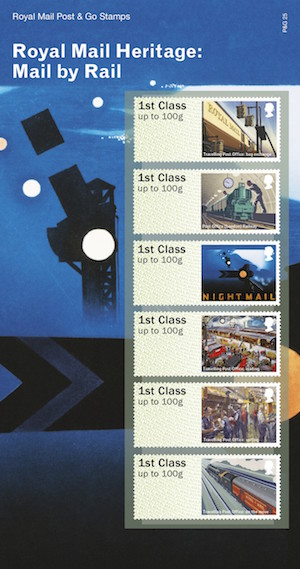
Travelling Post Office: bag exchange
A specially designed apparatus enabled leather pouches containing mail bags
to be exchanged with a moving Travelling Post Office (TPO). Pouches were
hung from track-side standards or train-side ‘traductors’ to be caught by
nets. The first successful mail-bag exchange was in 1838.
Post Office (London) Railway
Also known as the Post Office Underground Railway, this subterranean line
connected sorting offices with London railway termini. Operating between
1927 and 2003, it was renamed Mail Rail in 1987. Up to 40,000 mail bags were
carried daily between Liverpool Street and Paddington over 6.5 miles
(10.5km).
Night Mail: poster - Three years after the GPO Film Unit’s
Night Mail film was released, in 1939 graphic artist Pat Keely designed an
iconic poster that captured the essence of TPO trains. In excess of 70 were
in operation at this time, transporting, sorting and despatching 27 million
letters every day and night.
Travelling Post Office: loading - ‘Euston Station: Loading
the Travelling Post Office’ is a 1948 poster designed by artist Grace
Golden. Main-line railway termini such as Euston station in London became
hives of activity as dozens of mail vans crowded in to have their post
unloaded for despatch across the country via the TPOs.
Travelling Post Office: sorting - A key feature of
Travelling Post Offices was that mail was sorted while on the move. The Up
Special TPO from Carlisle was the longest TPO in the world and could have 50
highly skilled postal staff working on it, while the smallest of mail trains
could have just a single sorter.
Travelling Post Office: on the move -The first bespoke
Travelling Post Office carried mail in 1838. By the 1930s there were 130
TPOs operating both night and day, with four exclusively functioning as mail
trains. Day services ceased following the Second World War and the final TPO
services ran on 9 January 2004.
Technical details:
Designed by Osborne Ross with illustrations by Andrew Davidson. ‘Bag
Exchange’, ‘Post Office (London) Railway’ and ‘On The Move’; Night Mail
poster by Pat Keely (1939) and ‘Loading’ painting by Grace Golden (1948) ©
Royal Mail Group Ltd, courtesy of The Postal Museum; ‘Sorting’ painting by
Ian Cryer (2003) © Ian Cryer. The detail of the Night Mail poster by Pat
Keely (1939) and photos of the Post Office (London) Railway and the Down
Special TPO service © Royal
Mail Group Ltd, courtesy of The Postal Museum. Printed in gravure by
International Security Printers, 56 x 25 mm, with two phosphor bands,
self-adhesive.
These will be on sale from machines Spring Stampex, and with an additional
inscription at the Postal Museum. The service indicators and datastrings
will be printed by machine in all cases. For
more information see our blog.
Products issued
The labels will be used in Post & Go machines at Post Offices and
Royal Mail Enquiry Offices around the country, and from the Royal Mail
machines at Spring Stampex.
A mint set of 6 x 1st will also be available from Royal Mail's Tallents
House Bureau in a pack similar to a presentation pack. All values in
the pack are 1st Class and the details are printed in gravure.
Royal Mail will again produce a First Day Cover and official First Day
Postmarks for these stamps.
Special postmarks available for the day of issue
were shown in Royal Mail's Postmark Bulletins (download
here)
This page updated 25 August 2017
If you wish to be told when this page is updated, please use the
ChangeDetection box at the top of this page.
If you have any questions, please email
us.
NB: all emails will be acknowledged in 1-2 days
unless we are away (see home page). If you do not receive an
acknowledgement please email us from a different address (eg hotmail,
gmail).
Instant
Printing Prices from Webmart
